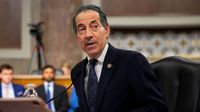In a dramatic escalation of tensions between local judiciary and federal immigration enforcement, Milwaukee County Circuit Court Judge Hannah Dugan was arrested on April 25, 2025, accused of helping an undocumented immigrant evade arrest. The FBI's actions against Dugan have sparked a fierce debate over the balance of power between state judges and the federal government, particularly under the Trump administration's aggressive immigration policies.
Dugan faces two federal counts of obstruction: one for concealing a person from discovery and arrest, and another for obstructing federal government proceedings. According to an affidavit from FBI Director Kash Patel, Dugan allegedly allowed Eduardo Flores-Ruiz, a Mexican national, to escape through a side door typically reserved for jurors after learning that Immigration and Customs Enforcement (ICE) agents were seeking his arrest. The incident occurred during a pretrial hearing on April 18, 2025, when Dugan reportedly escorted Flores-Ruiz and his attorney out of the courthouse.
"Judge Dugan increased danger to the public by letting Flores-Ruiz leave her courtroom," Patel stated in a social media post, which has since been deleted. Flores-Ruiz was apprehended outside the courthouse shortly after his escape, as agents pursued him on foot.
During a brief court appearance on Friday, Dugan's attorney, Craig Mastantuono, vehemently protested her arrest, arguing it was not made in the interest of public safety. "Judge Dugan wholeheartedly regrets and protests her arrest," he said. If convicted, she faces a maximum penalty of six years in prison.
The arrest comes amid a broader crackdown by the Trump administration on judges perceived to be obstructing immigration enforcement. Attorney General Pam Bondi warned that Dugan's arrest is just the beginning, stating on Fox News, "If you are harboring a fugitive, we don’t care who you are, if you are helping hide one... we will prosecute you. We will find you." Bondi characterized judges who assist immigrants as “deranged,” reflecting the administration's increasingly aggressive stance toward those who oppose its policies.
Reactions to Dugan's arrest have been sharply divided along party lines. Democratic lawmakers have expressed outrage, with House Judiciary Committee ranking member Jamie Raskin describing the arrest as a dangerous escalation that undermines judicial independence. "It is remarkable that the Administration would dare to start arresting state court judges. It's a whole new descent into government chaos," Raskin remarked.
Rep. Mark Pocan, a Democrat from Wisconsin, echoed these sentiments, stating, "The Trump administration again is breaking norms in how it's dealing with immigration, the legal system, and normalcy. This is stuff I expect from Third World countries." Meanwhile, Republican representatives, including Derrick Van Orden, have defended the actions against Dugan, asserting that many judges are acting politically to sabotage the Trump agenda.
In a striking parallel, Dugan's case mirrors that of Massachusetts Judge Shelley Joseph, who was indicted in 2018 for allegedly helping an undocumented immigrant evade ICE. Joseph's case was seen by many as a politically motivated attack on judicial independence, and the charges were ultimately dropped in 2022 under the Biden administration.
Wisconsin Governor Tony Evers criticized the Trump administration for its handling of the judiciary, stating, "They are attempting to undermine our judiciary at every level, including flat-out disobeying the highest court in the land and threatening to impeach and remove judges who do not rule in their favor." His comments highlight the ongoing struggle between state courts and federal immigration enforcement.
As the legal battle unfolds, Dugan is scheduled to return to court on May 15, 2025, where the implications of her arrest will likely continue to resonate throughout the legal community and beyond. Activists and legal experts warn that such actions may deter judges from performing their duties impartially, fearing repercussions from federal authorities.
In the broader context, the Trump administration's immigration policies have faced significant criticism and legal challenges, with recent surveys indicating that while many Americans support a crackdown on illegal immigration, a substantial portion believes the administration has overstepped its bounds. A new AP-NORC poll reveals that 46% of U.S. adults approve of Trump's handling of immigration, yet many also express concern that he has gone too far.
As the nation grapples with these complex issues, the arrest of Judge Dugan serves as a stark reminder of the ongoing tensions between state and federal authority, particularly in the realm of immigration enforcement. The outcome of her case could have lasting implications for the judiciary and the future of immigration policy in the United States.






